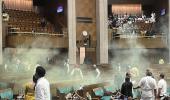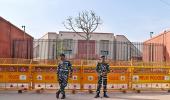Five of the six accused in the Parliament security breach case have been taken to Gujarat for the polygraph and narco-analysis tests, the police said on Monday.

The five accused are Sagar Sharma, Manoranjan D, Amol Shinde, Lalit Jha and Mahesh Kumawat, they said.
The police officials said all the five accused will have to undergo the polygraph test, while Sagar and Manoranjan will have to undergo additional naro-analysis and brain mapping tests.
"The tests will be conducted at the Forensic Science Laboratory in Gandhinagar," said a police officer.
Neelam Azad, the sixth accused, did not give her consent for the test before a court in Delhi on Friday.
The Delhi police had earlier moved the court seeking permission to conduct the polygraph test of all the accused.
The police had informed the court that an expert has recommended Sagar and Manoranjan for narco-analysis and brain mapping after conducting a psycho-analysis test on them.
In a major security breach on the anniversary of the 2001 Parliament terror attack on December 13, two people -- Sagar Sharma and Manoranjan D -- jumped into the Lok Sabha chamber from the public gallery during the Zero Hour, released yellow gas from canisters and shouted slogans before being overpowered by the MPs.
Around the same time, two other accused -- Shinde and Azad -- also sprayed coloured gas from canisters while shouting "tanashahi nahi chalegi" outside the Parliament premises.
All the six accused are in police custody for eight days.
A narco-analysis test involves the intravenous administration of a drug that causes the subject to enter into a stage of anesthesia during which the person becomes less inhibited and is more likely to divulge information, which would usually not be revealed in the conscious state.
Brain mapping, which is also called neuro mapping technique, analyses the brain's responses to images or words related to the crime.
In a polygraph test, efforts are made to ascertain whether the subject is lying or not by tracking breathing rate, blood pressure, perspiration and heart rate, while the person is asked various questions.











 © 2025
© 2025